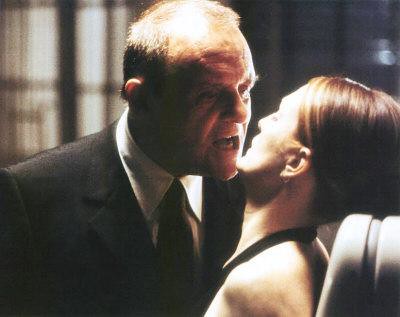
A review of “Hannibal”
review by James Harleman
Hannibal Lecter Anthony Hopkins
Clarice Starling Julianne Moore
Mason Verger Gary Oldman
Paul Krendler Ray Liotta
Giancarlo Giannini Rinaldo Pazzi
Directed by Ridley Scott
Based on the novel by Thomas Harris
“You can look at my face. yet you shied away when I said the name of God.”
Gary Oldman-completely unrecognizable as the horribly disfigured, Lecter-obsessed billionaire Mason Verger-stares up at Julianne Moore”s character (originally played by Jodie Foster in “The Silence of the Lambs”) and points out the strong woman”s vulnerability in one of the film”s most poignant lines. (Yes-that”s Gary Oldman, though he”s not even credited in the film. Once again, his voice and appearance have transformed; most people won”t even realize he”s in the film.)
Guilt and morality are key issues in the third-yes, third-film featuring the insidious cannibal killer, and this time around Ridley Scott has crafted a thought-provoking, subtle ensemble piece… most of which will likely be missed by biased viewers.
Having escaped the asylum in “The Silence of the Lambs,” Dr Lecter successfully vanished and now, ten years later, he has been taken off the FBI”s 10 most wanted list. After a FBI bust becomes public relations nightmare, Clarice Starling finds herself a convenient scapegoat and manipulated by her bigoted “ally”, Paul Krendler (Liotta). Confined to a life-support system, Mason Verger-Lector”s only surviving victim-uses his money, power, and Starling”s situation to seek his revenge, scheming to draw Lecter out of his hiding place by using the one person he truly seemed to care for.
Lecter, laying low in Florence, Italy, has secured a prominent position for himself; however, when Inspector Pazzi (a wonderfully nuanced performance by Giancarlo Giannini) discovers Hannibal” true identity, hides it from his colleagues, and contacts Verger to secure the substantial reward… the game is afoot. Though Lecter likely holds the most screen time from a technical standpoint, there almost seems to be no central character in the film. Unlike “Silence”, which centered heavily on Clarice, “Hannibal” is a fluid study of intersecting characters; we are shown each person”s unique desires and motivations, how it affects them, and where it leads them as they revolve around Lecter. Though each enters the frame for a different reason, with a different agenda, they share the same, noticeable lack of morality. which leaves the viewer with little sympathy for them. Whether it”s Krendler”s lecherousness and ambition, Pazzi”s greed, or Verger”s vengeance, their skeletons emerge for our scrutiny. Starling”s character is muddled as well; when the pillars of morality crumble and the department turns against her, even she has lost her moral compass. “This changes everything,” she tells her superiors, “this changes ME.” Her reasons for seeking Lecter are questionable as well; although she never violates her principles, we can see she wrestles with a strange fascination for the Doctor. And capturing him is the key to saving her career. However, the film never shines the light brightly on Clarice”s troubled soul-she remains the ethical enigma-and so she becomes the mixed emotional window through which the viewer observes the moral movements of the film.
 It is this muddled and disgusting lack of conscience in the entire cast that has an unsettling effect on the viewer. Though wholly captivating, most of the cast intersecting with Lector seem so petty, selfish, unlikable or lukewarm that viewers finds themselves WISHING the nearly-inhuman Hannibal would dispatch them as punishment for their sin. It is frightening to feel this way. We discover that the more trivial, common moral flaws are less palatable to us than the actions of the serial killer and cannibal, and this wounds our ego. since these are flaws we all share. At least Hannibal isn”t a hypocrite; his worldview is consistent. The two-faced Krendler and pious Verger reek of hypocrisy, and Giannini”s guilt, fear, and emotional turmoil echoes our own struggle between conscience and desire. Hannibal-with his pure freedom in depravity-delivers a warped justice to characters who embody all our worst traits. Moreover, the humanistic moral pillar, represented by Clarice, is powerless to stop it. She is truly lost-the system is corrupt, the culture is corrupt, the “have”s” are pathetic, the “have-not”s” are greedy, and her alleged allies are brainless back-stabbers. As Verger points out (with perhaps his only intelligent observation) Starling is afraid of faith in God; consequently, her foundation does not rest on an objective, unchanging Deity; by the film”s end her foundation has collapsed, and she is adrift. an empty vessel at the mercy of the tides.
It is this muddled and disgusting lack of conscience in the entire cast that has an unsettling effect on the viewer. Though wholly captivating, most of the cast intersecting with Lector seem so petty, selfish, unlikable or lukewarm that viewers finds themselves WISHING the nearly-inhuman Hannibal would dispatch them as punishment for their sin. It is frightening to feel this way. We discover that the more trivial, common moral flaws are less palatable to us than the actions of the serial killer and cannibal, and this wounds our ego. since these are flaws we all share. At least Hannibal isn”t a hypocrite; his worldview is consistent. The two-faced Krendler and pious Verger reek of hypocrisy, and Giannini”s guilt, fear, and emotional turmoil echoes our own struggle between conscience and desire. Hannibal-with his pure freedom in depravity-delivers a warped justice to characters who embody all our worst traits. Moreover, the humanistic moral pillar, represented by Clarice, is powerless to stop it. She is truly lost-the system is corrupt, the culture is corrupt, the “have”s” are pathetic, the “have-not”s” are greedy, and her alleged allies are brainless back-stabbers. As Verger points out (with perhaps his only intelligent observation) Starling is afraid of faith in God; consequently, her foundation does not rest on an objective, unchanging Deity; by the film”s end her foundation has collapsed, and she is adrift. an empty vessel at the mercy of the tides.
Scott is in top directing form again (Gladiator had good action, but some shots and effects were poorly executed). From the opening in Verger”s lavish living room to the streets of Florence, the cinematography is beautiful. Despite a poorly cut preview that seems to show Hopkins chewing scenery and mugging for the camera, he is wonderfully subdued in the film”s context, a calm yet predatory gentleman, which makes his. “misconduct”. even more unsettling. Julianne Moore is a beautifully cultivated extension of Jodie Foster”s critically acclaimed portrayal. Many critics and feminists will disagree, for political reasons. because ten years have not been kind to the stalwart Starling. She exhibits a lack of vigor, strength and resolve, as time and environment have eroded the qualities that made viewers unanimously declare her a hero in “Silence of the Lambs”. I think Moore”s portrayal is not only good, but honest as well.
It”s unfortunate the filmmakers second-guessed Harris” portrayal of Starling in the novel upon which this film is based. Perhaps Harris did sell out, or depicted it poorly-I have not yet read the book-but I suspect again that the criticism has more to do with political-correctness and humanism than with good storytelling. In the book, Lecter subverts Clarice”s will, wooing and winning her over to his worldview at the end. Since Jodie Foster”s portrayal of the character elevated Starling to an icon of stable psychological order and female empowerment, most dare not consider that such a person might be so easily upended. We don”t want to believe that Hannibal”s depravity exists within us, or that we are so closely related. We don”t want to admit that it only takes a nudge to bridge the gap between his sins and ours. or that both are deserving of the same punishment. As Kevin Spacey pointed out to the common man in the film “Seven”: “It”s “comfortable” for you to label me as insane.”


[…] Citizen Kane Hannibal Insomnia The Exorcist The Passion of the Christ Constantine Final Destination 3 […]